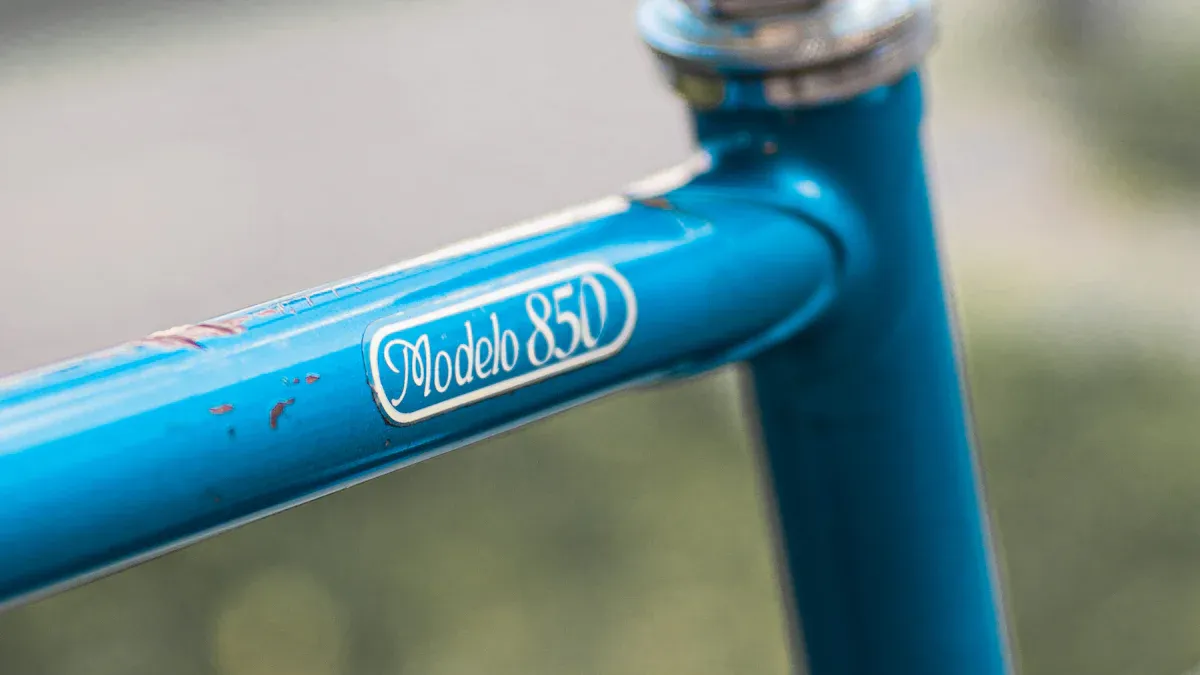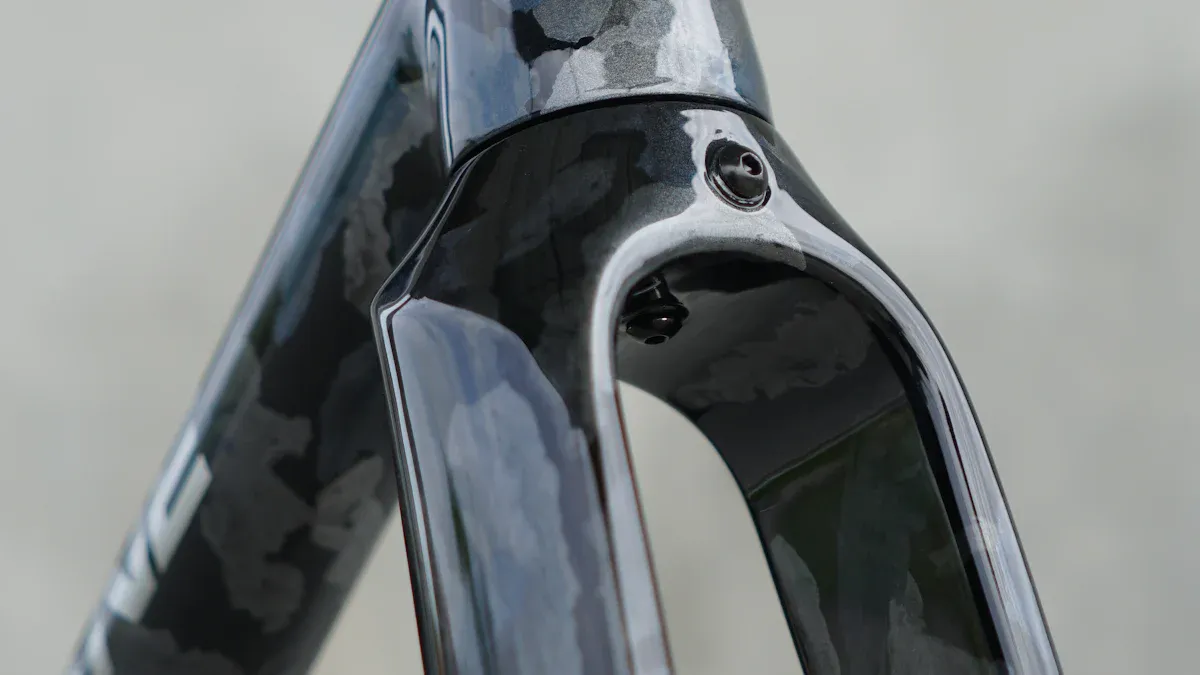
Choosing the right material for your road bike body frame is very important. It can change how well you ride, how comfortable you feel, and how much money you spend. Each material has special benefits that can make your ride better. Think about how you ride and what you like when you make this choice. Knowing how different materials affect your ride will help you pick the best road bike body frame for you.

Key Takeaways
Picking the best bike frame material changes how you ride. It also affects your comfort and how much money you spend.
Aluminum frames are cheap, light, and strong. This makes them good for many riders.
Carbon fiber frames give you great performance and a smooth ride. However, they cost more and can be tough to fix.
Aluminum Frame Materials

Aluminum Characteristics
Aluminum frames are very popular in cycling. They are great for budget and mid-range bikes. These frames are made from aluminum alloy. This material is light and strong. Here are some important features of aluminum:
Lightweight: Aluminum is one of the lightest metals for bike frames. This makes bikes easier to control, especially when going uphill or speeding up.
Stiffness: Aluminum is stiff. This helps power move from you to the pedals. It makes your ride feel more responsive and connected.
Durability: Aluminum is tough. It can handle the demands of cycling. It resists rust and absorbs shocks well. This makes it a good choice for different riding conditions.
In the past, aluminum took the place of heavier steel to save weight in road bikes. Modern aluminum frames are very light. However, they are still heavier than carbon fiber frames, which can be lighter by a pound or more.
Pros and Cons of Aluminum
When thinking about aluminum frames, it’s important to look at the pros and cons. Here’s a simple list:
Pros:
Affordability: Aluminum frames usually cost less than $2,000. This makes them a good choice for many riders. You can build a custom bike without spending too much.
Versatility: Aluminum can be shaped into many tube designs. This gives manufacturers more options to create unique and aerodynamic bikes.
Corrosion Resistance: Aluminum does not rust easily. This helps your bike last longer. You can enjoy it for years without worrying about rust.
Performance Balance: Aluminum might feel harsher than other materials. But many riders like its stiffness and quick response.
Cons:
Crash Response: Aluminum frames can dent or bend in a crash. This can weaken them. Carbon frames might crack but can sometimes be fixed.
Repairability: If aluminum frames get damaged, they are hard to repair. This might mean you need to buy a new one.
Fatigue Life: Aluminum usually lasts about five years. This is shorter than materials like titanium.
Here’s a quick comparison of the good and bad sides of aluminum frames:
Advantage | Description |
|---|---|
Lightweight | Aluminum is light, making it easier to ride and control. |
Affordability | It is a budget-friendly choice for those wanting high-performance frames. |
Versatility | Aluminum can be shaped into many designs, giving more options. |
Performance balance | It may feel harsher, but many like its stiffness and quick response. |
Corrosion resistance | Aluminum frames resist rust, helping them last longer. |
Variety of options | There are many budget-friendly choices because of its popularity. |
Carbon Fiber Frames

Carbon Fiber Characteristics
Carbon fiber frames are very popular in cycling. They are especially used in high-performance road bikes. This material is made of thin strands of carbon atoms woven together. This creates a strong and lightweight structure. Here are some important features of carbon fiber:
High Strength-to-Weight Ratio: Carbon fiber is very strong but also light. This helps you ride faster and climb hills easier.
Stiffness: It has a high modulus of elasticity. This means it doesn’t change shape much under stress. This stiffness helps power move from your legs to the pedals, improving your ride.
Corrosion Resistance: Carbon fiber does not rust like metals. This makes it good for outdoor use. You won’t worry about damage from the weather.
Thermal Stability: Carbon fiber stays strong in different temperatures. This is helpful for high-temperature situations, so your bike works well in many conditions.
Fatigue Resistance: This material can handle repeated stress without breaking. This durability helps your bike parts last longer.
Pros and Cons of Carbon Fiber
When thinking about carbon fiber frames, it’s important to look at the pros and cons. Here’s a simple list:
Pros:
Performance Benefits: Carbon fiber frames are strong and light. They absorb road bumps, giving you a smoother ride. This is great for long rides or races.
Aerodynamic Advantages: Carbon fiber can be shaped to reduce drag. This design helps you go faster, making it popular with competitive cyclists.
Customization: Manufacturers can shape carbon fiber in many ways. This allows for unique designs that fit different riding styles.
Cons:
Cost: Carbon fiber frames usually cost more than aluminum ones. The production costs and material availability make them pricier.
Durability Concerns: Experts say carbon fiber parts can be light and cheap, but they may not be very durable. They can fail without showing damage. This means you need to check them regularly.
Repair Challenges: If a carbon fiber frame gets damaged, fixing it can be hard. Unlike aluminum or steel, which can often be repaired, carbon fiber might need to be replaced if it cracks.
Here’s a quick comparison of carbon fiber frames with other materials:
Property | Carbon Fiber Frames | Aluminum Frames | Steel Frames | Titanium Frames |
|---|---|---|---|---|
Weight | Lightweight | Moderate | Heavy | Lightweight |
Strength | High | Moderate | High | High |
Stiffness | Very High | Moderate | Moderate | High |
Corrosion Resistance | Excellent | Good | Poor | Excellent |
Cost | High | Low | Moderate | High |
In 2023, carbon fiber bikes won 98% of professional road races. This shows how popular they are in competitive cycling. However, be careful of common problems, like bad assembly causing failures. Regular maintenance is important to find wear and tear, especially where parts are clamped.
Steel Frame Materials
Steel Characteristics
Steel frames are a classic choice for cyclists. Many riders like them because they are strong and last a long time. Chromoly steel is known for lasting many years. This material can handle tough conditions and is less likely to break suddenly. You can still ride a steel frame even if it has some damage. This makes it a good choice for long trips.
Here are some key features of steel frames:
Durability: Steel frames can last for many years with care. They resist wear better than aluminum and carbon fiber.
Weight: Steel frames are usually heavier than aluminum and carbon fiber. However, they balance strength and weight well. Using high-quality steel, like Reynolds 853, can help make them lighter without losing performance.
Performance: Steel frames give a smooth ride. Their natural flexibility helps absorb bumps in the road, making long rides more comfortable.
Pros and Cons of Steel
When thinking about steel frames, you should consider the pros and cons:
Pros:
Strength: Steel frames are strong and can carry heavy loads. This makes them great for touring and commuting.
Improved Suspension: The springy nature of steel makes rides on bumpy roads more comfortable.
Affordability: Steel frames are often cheaper than carbon fiber and titanium. They are also easier to fix if damaged.
Cons:
Weight: Steel frames can be heavier than other materials. This might slow you down or make climbing harder.
Corrosion: Steel can rust. You need to take care of it to keep your bike in good shape.
Thermal Conductivity: Steel can lose strength in high heat. This may affect how well it performs in extreme conditions.
Here’s a quick comparison of how durable different bike frame materials are:
Material | Durability Description |
|---|---|
Steel | Very durable, can last for many years, less likely to break suddenly, can be ridden even with damage. |
Aluminum | Has a limited life, will develop cracks after long use, but can last many years with regular riding. |
Carbon Fiber | Strong under pressure, but can be damaged by impacts, needing special repairs if broken. |
Titanium Frame Materials
Titanium Characteristics
Titanium frames are known for being light and strong. They are lighter than steel but heavier than aluminum and carbon fiber. This balance lets you have a strong frame without too much weight. Here are some important features of titanium:
Durability: Titanium frames can last a very long time. They do not rust, so they work well in different weather. You won’t worry about rust like with steel.
Flexibility: Titanium tubes can absorb shocks. This flexibility gives you a smooth ride, especially on bumpy roads.
Strength-to-Weight Ratio: Titanium is stronger than steel for its weight. This means you get a frame that is as light as aluminum but as strong or stronger than steel.
Pros and Cons of Titanium
When thinking about titanium frames, consider the pros and cons carefully:
Pros:
Performance Benefits: Titanium frames perform really well. They are light and strong, making them great for long rides and tough conditions.
Aesthetic Appeal: The unique look of titanium frames makes them popular. Many cyclists like the sleek design and finish.
Longevity: A good titanium frame can last for many years, making it a smart investment.
Cons:
Cost: Titanium frames can be expensive. Prices start around $1,899, which might be too much for some cyclists. The making process is complicated, which raises the price.
Limited Availability: There are not many manufacturers for titanium frames. This means you might have trouble finding parts, which can delay repairs or upgrades.
Here’s a quick comparison of frame materials based on weight:
Material | Weight Comparison |
|---|---|
Titanium | Lighter than steel, heavier than aluminum and carbon fiber |
Aluminum | Lightest among the three materials |
Carbon Fiber | Lightest among the three materials |
Steel | Heaviest of the materials |
Choosing titanium frames gives you a mix of performance and durability. If you want a long-lasting, light frame, titanium might be the right choice for you.
Choosing the right material for your bike frame affects how you ride. Here’s a simple comparison:
Material | Benefits | Things to Think About |
|---|---|---|
Carbon | Costs more, can break easily | |
Aluminum | Cheaper, strong, dependable | Heavier, not as smooth on bumpy roads |
Steel | Lasts long, comfy to ride | Heavier, can rust easily |
Titanium | Light, lasts a long time | Costs a lot, hard to find |
Think about how you ride, your budget, and what feels good when picking your frame. Each material has special benefits that can make your ride better.
FAQ
What is the best material for a road bike frame?
The best material depends on what you need. Carbon fiber gives great performance. Aluminum is good for your budget. Steel is very strong, and titanium is a mix of lightness and strength.
How do I choose the right frame material?
Think about how you ride, your budget, and what feels comfortable. Each material has special benefits for different types of cyclists.
Are aluminum frames good for racing?
Yes, aluminum frames are light and stiff. This makes them great for racing. They give a quick ride at a good price.
See Also
Selecting the Perfect Aluminum Frame for Your Cycling Style
Reasons to Opt for a Carbon Frame in Your Upgrade
Finding the Ideal Bike Frame to Suit Your Requirements
Comparing Enduro Frame Materials for Durability and Strength
Understanding Track Bike Frame Materials and Their Importance
